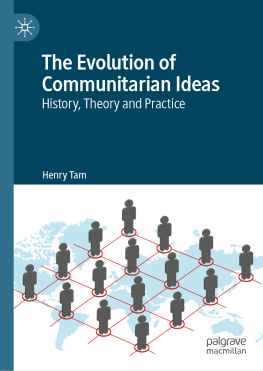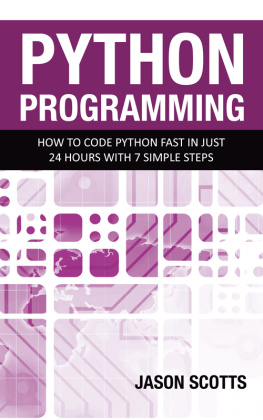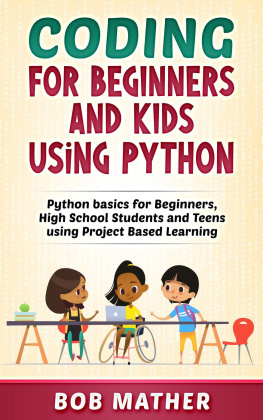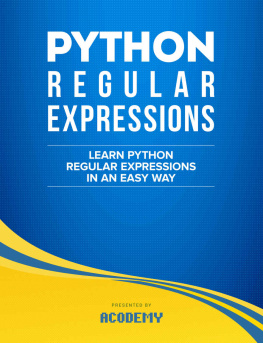TAM - LEARN PYTHON BASICS: FOR BEGINNERS AND PYTHON WORKBOOK FOR EXAMS AND INTERVIEWS: FAST AND EASY WAY TO LEARN CODING BASICS
Here you can read online TAM - LEARN PYTHON BASICS: FOR BEGINNERS AND PYTHON WORKBOOK FOR EXAMS AND INTERVIEWS: FAST AND EASY WAY TO LEARN CODING BASICS full text of the book (entire story) in english for free. Download pdf and epub, get meaning, cover and reviews about this ebook. year: 2021, genre: Computer. Description of the work, (preface) as well as reviews are available. Best literature library LitArk.com created for fans of good reading and offers a wide selection of genres:
Romance novel
Science fiction
Adventure
Detective
Science
History
Home and family
Prose
Art
Politics
Computer
Non-fiction
Religion
Business
Children
Humor
Choose a favorite category and find really read worthwhile books. Enjoy immersion in the world of imagination, feel the emotions of the characters or learn something new for yourself, make an fascinating discovery.

LEARN PYTHON BASICS: FOR BEGINNERS AND PYTHON WORKBOOK FOR EXAMS AND INTERVIEWS: FAST AND EASY WAY TO LEARN CODING BASICS: summary, description and annotation
We offer to read an annotation, description, summary or preface (depends on what the author of the book "LEARN PYTHON BASICS: FOR BEGINNERS AND PYTHON WORKBOOK FOR EXAMS AND INTERVIEWS: FAST AND EASY WAY TO LEARN CODING BASICS" wrote himself). If you haven't found the necessary information about the book — write in the comments, we will try to find it.
TAM: author's other books
Who wrote LEARN PYTHON BASICS: FOR BEGINNERS AND PYTHON WORKBOOK FOR EXAMS AND INTERVIEWS: FAST AND EASY WAY TO LEARN CODING BASICS? Find out the surname, the name of the author of the book and a list of all author's works by series.
LEARN PYTHON BASICS: FOR BEGINNERS AND PYTHON WORKBOOK FOR EXAMS AND INTERVIEWS: FAST AND EASY WAY TO LEARN CODING BASICS — read online for free the complete book (whole text) full work
Below is the text of the book, divided by pages. System saving the place of the last page read, allows you to conveniently read the book "LEARN PYTHON BASICS: FOR BEGINNERS AND PYTHON WORKBOOK FOR EXAMS AND INTERVIEWS: FAST AND EASY WAY TO LEARN CODING BASICS" online for free, without having to search again every time where you left off. Put a bookmark, and you can go to the page where you finished reading at any time.
Font size:
Interval:
Bookmark:
LEARN PYTHON BASICS: FOR BEGINNERS AND PYTHON WORKBOOK FOR EXAMS AND INTERVIEWS FAST AND EASY WAY TO LEARN CODING BASICS JP TAM
LEARN PYTHON BASICS: FOR BEGINNERS FAST AND EASY WAY TO LEARN CODING BASICS JP TAMOn February 20, 1991, the first version was released. The Python programming language borrows ideas from the ABC programming language. ABC is a general-purpose programming language whose most notable accomplishment was influencing the creation of Python. The ABC programming language is the forerunner of the Python programming language. ABC may handle exceptions and communicate with the Amoeba Operating System. Fact about choosing a name: Guido van Rossum was a major fan of the BBC's iconic TV show 'Monty Python's Flying Circus,' so the title was inspired by it.
Python was the name he came up with for his invention because he wanted something short, interesting, and a little mysterious. Python version 1.0 was released in 1994, and it included new features such as map, filter, and reduce. In October of 2000, Python 2.0 was announced, with new features such as list comprehension and a garbage collection system. On December 3, 2018, Python 3.0, also known as "Py3k," was launched with new features. In Python 2.x, for example, print is a sentence. print() is a function in 3.x.
Usage of Python Python is a programming language that is used by many programmers in a variety of fields. It is usually used to execute any complex task in a much more straightforward manner than other programming languages. When Python is installed, it creates a number of powerful libraries that contain a variety of functions. There are several libraries available on the internet that make it easier to complete complicated tasks. It is a powerful programming language because of these standard libraries. Python is used extensively in the following areas:
- Web development,
- Software development,
- Machine Learning,
- GUIs based applications,
- Network programming,
- Game development,
- Mathematics
- Artificial Intelligence
- Data Science
Python is Open Source language: Python can be downloaded for free from its official website (www.python.org). Python can be downloaded from its official website for anyone. Here are some reasons why Python is the most popular language these days: Easy to use: Python is a simple language to learn and use. It is an easy-to-understand language. In comparison to other languages, it only requires a few lines to express the code. For instance, if you want to print Hello world in Java, the code will be as follows:
Frameworks and Libraries Python has a number of frameworks for different types of production. The following are some common frameworks: Server-side web development: Django is the most common Python web development platform. Flask, Pyramid, CherryPy, and other modeling tools are also included.
- Tk, PyGTK, PyQt, PyJs, and other GUI-based applications
- Mathematics: Numpy, Pandas, etc.
OOPs definitions in Python are as follows:
- Classes
- Objects
- Inheritance
- Polymorphism
- Encapsulation
Its data structures are effective, and its elegant syntax makes it a user-friendly language. The following are some of Python's most important features: Python is Easy a) Easy to code When opposed to other programming languages such as Java and C++, Python makes coding a breeze. Python syntax does not take long to learn; anyone can learn it in a few hours or days, making it a programmer-friendly language. If you have strong logical skills, you can learn this language easily even if you don't know how to code. b) Easy to read Python code is somewhat similar to English since it is a high-level programming language. Curly braces are not used; instead, indentation is used to describe the code block, and the code is simple to read.
High-level Language Python is a programming language with a high degree of abstraction. It focuses more on the programming logic than on critical hardware components like memory addressing and register use. Its code is self-contained and does not require any prior knowledge of the system architecture. We also don't have to worry about memory management. 3. Interpreted In programming languages such as C or C++, there are two steps to executing code: first compile it, then run it, while Python does not require compiling.
Internally, the source code is translated to byte code, which is a fast format. Python is an interpreted language, which means that it executes code line by line and in its entirety. As a result, debugging the code is much simpler. It's a little slower than JAVA because of the interpreter, but that's not a big deal because it's better than other languages. Python has a greater degree of flexibility than compiled languages. It manages memory for you automatically.
Object-Oriented Python is an object-oriented programming language that supports concepts such as objects, classes, encapsulation, inheritance, and so on. It is object-oriented and integrates data and functions. Real-world entities are defined in OOPs by objects, and classes are the object's blueprint. It also works with procedural languages. Functions are central to procedural language programming, which makes code reusable. The most natural and practical approach is object-oriented programming.
Font size:
Interval:
Bookmark:
Similar books «LEARN PYTHON BASICS: FOR BEGINNERS AND PYTHON WORKBOOK FOR EXAMS AND INTERVIEWS: FAST AND EASY WAY TO LEARN CODING BASICS»
Look at similar books to LEARN PYTHON BASICS: FOR BEGINNERS AND PYTHON WORKBOOK FOR EXAMS AND INTERVIEWS: FAST AND EASY WAY TO LEARN CODING BASICS. We have selected literature similar in name and meaning in the hope of providing readers with more options to find new, interesting, not yet read works.
Discussion, reviews of the book LEARN PYTHON BASICS: FOR BEGINNERS AND PYTHON WORKBOOK FOR EXAMS AND INTERVIEWS: FAST AND EASY WAY TO LEARN CODING BASICS and just readers' own opinions. Leave your comments, write what you think about the work, its meaning or the main characters. Specify what exactly you liked and what you didn't like, and why you think so.





